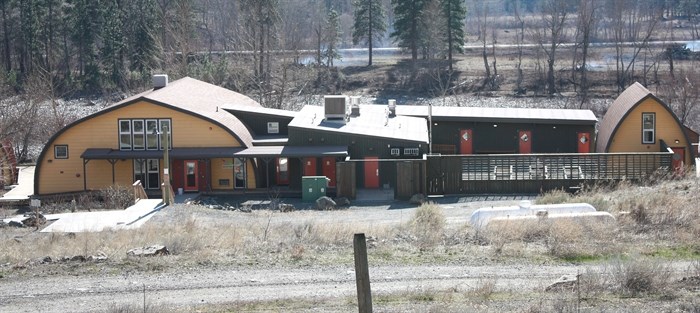
The main hall and administrative area of The Crossing near Keremeos. The youth treatment centre, operated by Portage, closed suddenly last Thursday, March 5.
(STEVE ARSTAD / iNFOnews.ca)
March 11, 2015 - 10:38 AM
PENTICTON - A lack of properly licensed staff was a key issue in the sudden closure of the Portage youth treatment facility near Keremeos known as The Crossing last Thursday, March 5, according to the provincial government.
“They gave us notice of their decision to withdraw on that day,” said Connie Coniglio, executive director for Children’s and Women’s Mental Health and Substance Abuse Programs. "We hadn't been able to come to an agreement, so it was their decision to terminate on March 5.”
Coniglio said there had also been licensing issues at the site for some time. Interior Health issued a notice to Portage in October, 2014 indicating they couldn’t admit kids because of licensing deficiencies. She said the provincial health authority installed a manager at Portage to help address the licensing issues at the end of October in order to meet Interior Health’s requirements for licensing.
“That’s taken up pretty much all our time and energy,” she said.
During that time, discussions with Portage about moving forward had been continuing, including implementation of an enhanced model of care including better staff training and closing a loop on access to community care, post-discharge. Portage talked about the possibility of pulling out during these discussions, but “we didn’t get any notice - it was sudden in that regard,” Coniglio said.
Over the past few days, Coniglio said the focus has been on the children and families who no longer have a place to go.
“The first thing we’ve done is have conversations with the families about options. We are meeting with our health authority partners to talk about those options we can provide for youth close to home, in the community right now to fill the gap,” she said, adding discussions with health authorities over the future of youth residential treatment facilities were also taking place.
“We recognize there is a gap, that youth residential treatment is very important in B.C. We understand it needs to be delivered in a particular kind of way, and at a certain standard, or level of care, and that was part of the conversation we were having with Portage, improving that standard of care,” Coniglio said, adding it was too early in the discussion to know what that new standard of care was going to look like.
She said The Crossing was still an option for continued future use as a youth treatment centre, but that will eventually be decided through discussions with health authorities regarding their needs, and whether those needs could be met at that site.
“I wouldn’t want to comment, definitively, on that at this point,” she said. "It’s a high priority for us to address this and move forward, so we are going to move quickly to make a determination what to do next. We understand these youth need care and treatment, and they need a certain standard of treatment that we are committed to ensuring they get."
The Crossing is currently owned by Central City Foundation, which leases the property to the provincial health services authority, under a master lease agreement.
Licensing issues at The Crossing included site issues with respect to the facilities. There were also issues surrounding adequately trained staff, their roles and having the right certification for their roles.
“All residential care facilities have to meet licensing standards, and we discovered in October that facility was not in compliance, so we immediately became involved,” Coniglio said.
Residential care facilities must operate in accordance with the Community Care Licensing Act, which is administered through regional health authorities.
“The Crossing is closed and we’re working hard to move things forward. We know that residential treatment for youth with severe substance abuse is very important in B.C., but we are really committed to the highest quality, safe, effective care, and that’s really what all this is about,” Coniglio said.
To contact the reporter for this story, email Steve Arstad at sarstad@infonews.ca or call 250-488-3065. To contact the editor, email mjones@infonews.ca or call 250-718-2724.
News from © iNFOnews, 2015